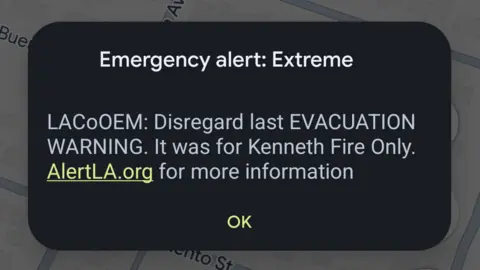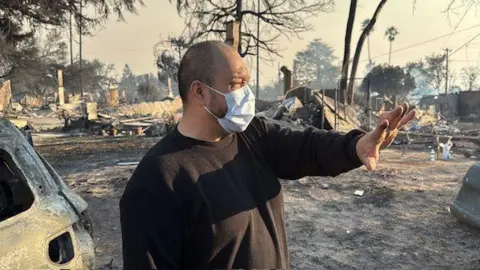Residents were already on edge as more wildfires raged across the Los Angeles region, hitting millions who thought the end was still four days later.
Then came another shock in the form of a text alert on Thursday afternoon.
It was mistakenly sent to every cell phone in the county — home to about 10 million people — warning them that the fire was nearby and that they should prepare to evacuate.
Rebecca Alvarez-Petit was on a video work call when her phone started ringing.
“An evacuation warning has been issued in your area,” the text message said.
The sound echoed around him as each of his colleagues received the same startling message.
“It was like a giant panic that I was watching in real-time,” he said.

He and colleagues began researching and trying to see if they were in imminent danger.
Immediate relief came in the form of a revised warning asking them to ignore the warning but it soon gave way to fresh fury, he said.
“We're all on pins and needles and anxiously sitting by our phones, looking at the TV, the radio playing – trying to stay as informed as possible because there wasn't a good system in place,” Ms Alvarez said. -Petit, who lives in West Los Angeles.
“And then this. It's like – you have to be kidding me.”
The death toll from the fire continues to rise and at least 10 people are said to have died and the number is likely to rise.
For many, the concern to save life and property has turned into a sense of frustration in controlling fires.
A mayor's frustration
Officials acknowledged some complaints, from hydrants running dry to questions about preparedness and fire mitigation investments, hampered firefighting efforts.
Los Angeles Mayor Karen Bass has come under fire after returning to the city from a previously planned trip to Africa. On Thursday, he faced intense questions about the region's preparedness, his leadership in the crisis and firefighters' failing water problems.
“Was I disappointed by it? Absolutely,” Mayor Bass said in response to a question about the water issue and whether the area was adequately prepared. He noted that it was an “unprecedented event”.
Like other officials, he emphasized that the fire was able to spread Tuesday because of strong winds — the same winds that prevent planes from dropping water or fire retardant on fires. He said the city's water system and surrounding fire hydrants weren't built to handle the thousands of acres of fire.
He noted that there would be a review of how the incident unfolded that would examine how officials and agencies handled it.
“When lives have been saved and homes saved, we will absolutely do an evaluation to see what worked, what didn't work, and to correct or hold any agency, department, individual accountable,” he said.
“Now my focus is on life and home.”

The question of water scarcity
The unfolding disaster has led to the need to understand why it happened and how it became the most destructive fire in Los Angeles history.
As Larry Villescas approached his home Tuesday, one of five fires now raging in Los Angeles County, he grabbed the only tool he had — a garden hose.
He and his neighbor made quick work of igniting the embers and grass that had fallen from the Eaton Fire to their house.
Then run the hose dry.
He saw his neighbors' houses on fire in Altadena. Then there was a boom – a nearby house caught fire and it sounded like an explosion. He had to leave.
As he drove away, he found his garage on fire.
“If we had water pressure, we would have been able to fight it,” Mr. Villescas said, standing in front of the charred wreckage of his home.
He saw firefighters that night — the community burned — sitting in their trucks, unable to help.
“I remember the anger. It was 'do something', but they couldn't – no water pressure,” he said. “It's just boring. How could that be?”
Some experts say the water shortage is due to unprecedented demand, not mismanagement.
“The problem is that the scope of the disaster is so broad that there are thousands of firefighters and hundreds of fire engines drawing on water,” Daniel Swain, a climate scientist at the California Institute for Water Resources, told the BBC.
“Eventually only so much water can flow through the pipe at once.”
Other neighbors shared their sentiment that the state was unprepared for the devastating fires it regularly sees.
Hipolito Cisneros, who was surveying the remains of his now-destroyed home, said the area's public utilities will need to be upgraded over the years.
“We've lived here 26 years and we've never seen it checked,” he said of the fire hydrant at the end of his block that failed to pump water when it was needed most.
Down the street, Fernando Gonzalez helped his brother move the rubble of his home of 15 years.
He noted that his own home in Santa Clarita — about 45 minutes away in Los Angeles County — was also threatened by various wildfires.
“We are just on high alert,” he said. “It's all around us, you know.”
